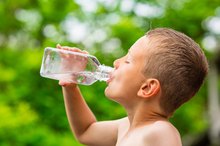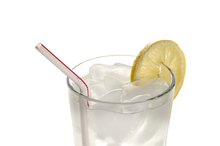What does fact checked mean?
At Healthfully, we strive to deliver objective content that is accurate and up-to-date. Our team periodically reviews articles in order to ensure content quality. The sources cited below consist of evidence from peer-reviewed journals, prominent medical organizations, academic associations, and government data.
- MayoClinic.com: Infant Formula: Is Tap or Bottled Water Better?
- Centers for Disease Control and Prevention: Background: Infant Formula and the Risk for Enamel Fluorosis
The information contained on this site is for informational purposes only, and should not be used as a substitute for the advice of a professional health care provider. Please check with the appropriate physician regarding health questions and concerns. Although we strive to deliver accurate and up-to-date information, no guarantee to that effect is made.
What Bottled Water Is Safe for Babies?
If you are searching for a type of water to use in order to mix your baby’s formula, or simply wondering what kind of water you can give your baby to drink, you may wonder which types of bottled water are best for him 1. It is best to follow the advice of your baby’s doctor when it comes to the type and amount of water that your baby needs, but in general, it's best to choose bottled water with low amounts of fluoride.
Enamel Fluorosis
Many water sources contain fluoride, including some types of bottled water. Your baby will also be exposed to fluoride from food and some types of toothpaste. Too much exposure to fluoride can result in enamel fluorisis, which begins when your baby’s teeth are still forming in her gums and can result in white spots on her teeth. The Centers for Disease Control and Prevention state that bottled water labels may not indicate the water’s fluoride concentration, so it is best to contact the bottler to make sure your baby is not getting too much fluoride.
- Many water sources contain fluoride, including some types of bottled water.
- The Centers for Disease Control and Prevention state that bottled water labels may not indicate the water’s fluoride concentration, so it is best to contact the bottler to make sure your baby is not getting too much fluoride.
Safe Bottled Water
How Much Water Should a 6-Year-Old Boy Drink per Hour?
Learn More
Although it's best to ask your baby’s doctor about which type of water is best for him to drink, bottled water labels that use the terms purified, demineralized, deionized, distilled, or prepared using reverse osmosis often indicate that the water is low in fluoride. If your baby is sick, his doctor may recommend that you boil the water for one minute and allow it to cool before use.
Importance of Fluoride
Although too much fluoride can cause enamel fluorosis, fluoride is still important. It helps prevent tooth decay and strengthens your baby’s teeth. According to Jay L. Hoecker, M.D., your baby’s doctor may recommend that she use a fluoride supplement beginning at six months of age if your baby drinks only nonfluoridated bottled water.
Time Frame
Water & Karo Syrup to Help Babies' Constipation
Learn More
The BabyCenter website notes that your baby only needs to drink breast milk or formula for the first six months of life 1. If he is given water too early, he may experience water intoxication because his kidneys are unable to handle the water overload. When he is six months old, he can have small amounts of plain water as long as the water does not replace his intake of breast milk or formula.
Bottled Water to Avoid
Avoid giving your baby bottled mineral water 3. The sodium in mineral water can be too hard on your baby’s digestive system. You should also avoid giving her carbonated water, which can cause stomach problems and gas pains.
Related Articles
References
- BabyCenter: What Kind of Water Should I Use to Prepare Baby Formula?
- MayoClinic.com: Infant Formula: Is Tap or Bottled Water Better?
- BabyCenter: When Can My Baby Drink Carbonated or Mineral Water?
- Aoun A, Darwiche F, Al Hayek S, Doumit J. The Fluoride Debate: The Pros and Cons of Fluoridation. Prev Nutr Food Sci. 2018 Sep;23(3):171-180. doi: 10.3746/pnf.2018.23.3.171. Epub 2018 Sep 30.
- Cheng X, Liu J, Li J, Zhou X, Wang L, Liu J, Xu X. Comparative effect of a stannous fluoride toothpaste and a sodium fluoride toothpaste on a multispecies biofilm. Arch Oral Biol. 2017 Feb;74:5-11. doi: 10.1016/j.archoralbio.2016.10.030. Epub 2016 Oct 29.
- Lv YG, Kang L, Wu G. Fluorosis increases the risk of postmenopausal osteoporosis by stimulating interferon γ. Biochem Biophys Res Commun. 2016 Oct 14;479(2):372-379. doi: 10.1016/j.bbrc.2016.09.083. Epub 2016 Sep 17.
- Peckham S, Lowery D, Spencer S. Are fluoride levels in drinking water associated with hypothyroidism prevalence in England? A large observational study of GP practice data and fluoride levels in drinking water. J Epidemiol Community Health. 2015 Jul;69(7):619-24. doi: 10.1136/jech-2014-204971. Epub 2015 Feb 24.
- Pornprasert S, Wanachantararak P, Kantawong F et al. Excessive fluoride consumption increases haematological alteration in subjects with iron deficiency, thalassaemia, and glucose-6-phosphate dehydrogenase (G-6-PD) deficiency. Environ Geochem Health. 2017 Aug;39(4):751-758. doi: 10.1007/s10653-016-9845-x. Epub 2016 Jun 18.
Writer Bio
Rose Welton is a journalism major and a freelance writer. Her education is focused on nutrition and early childhood studies, making her an expert when it comes to writing about health and children's growth and development. She has written numerous articles and blog posts on various topics for online publications and has also worked on an Internet news team.









